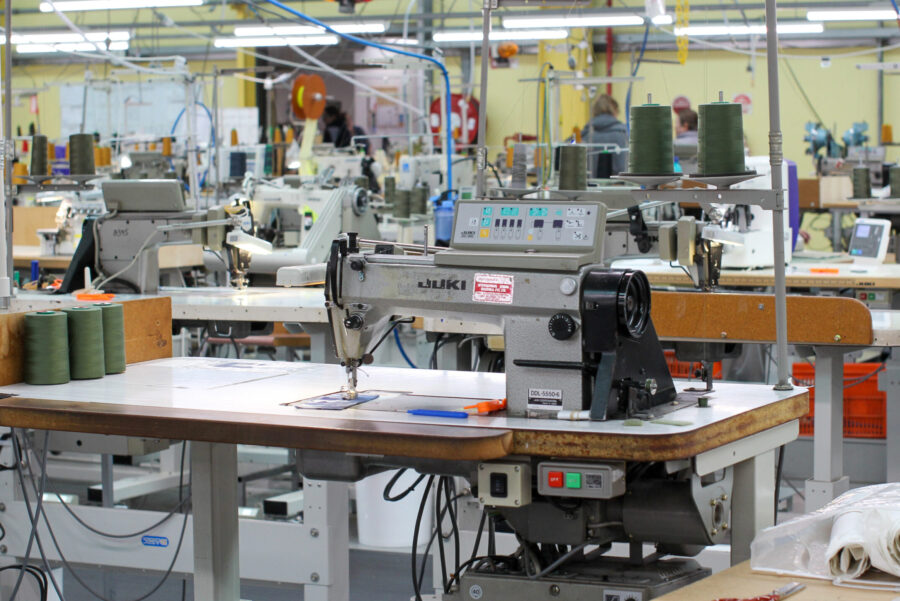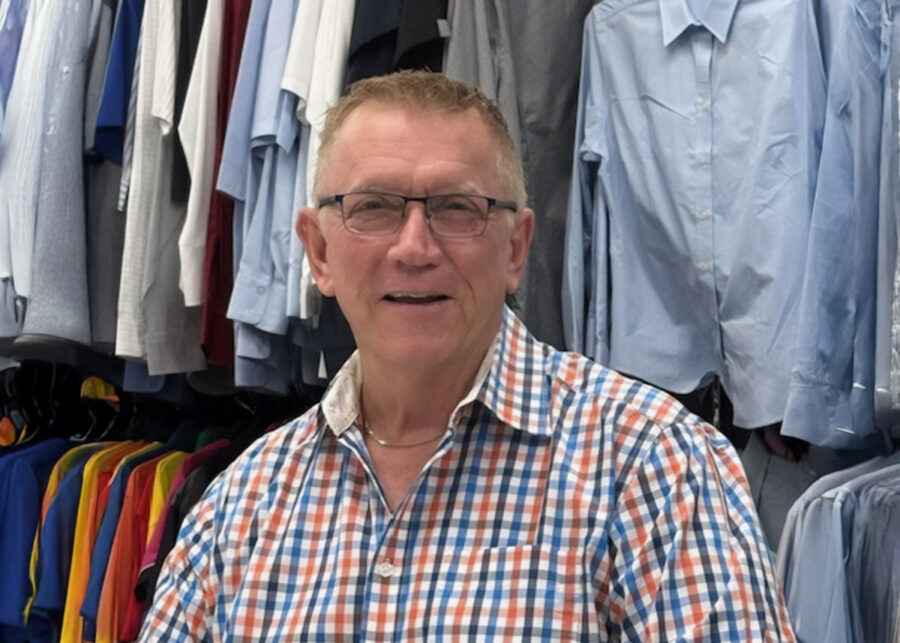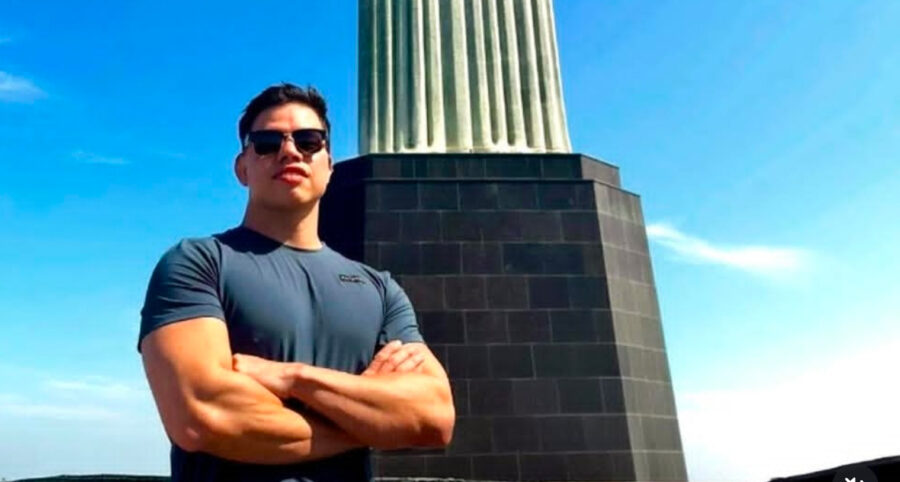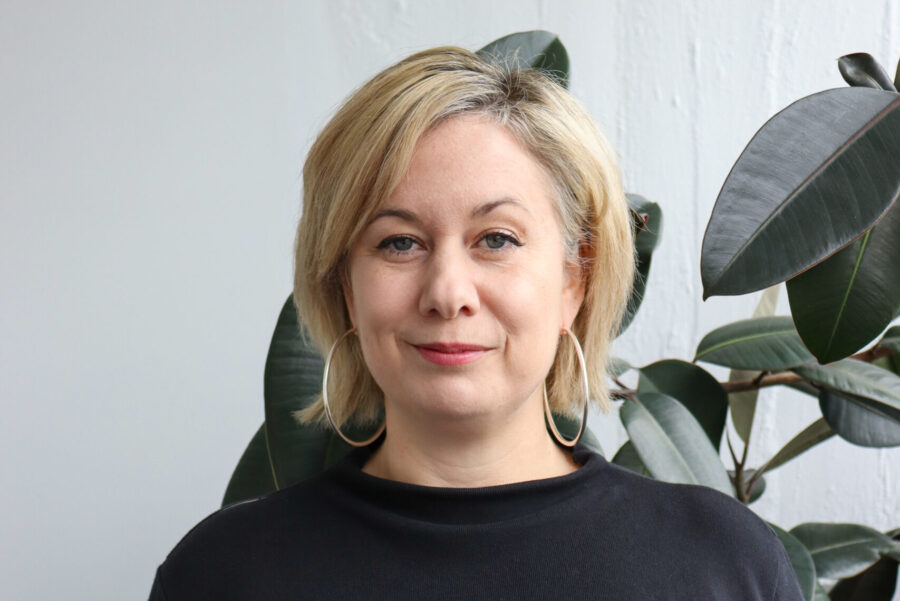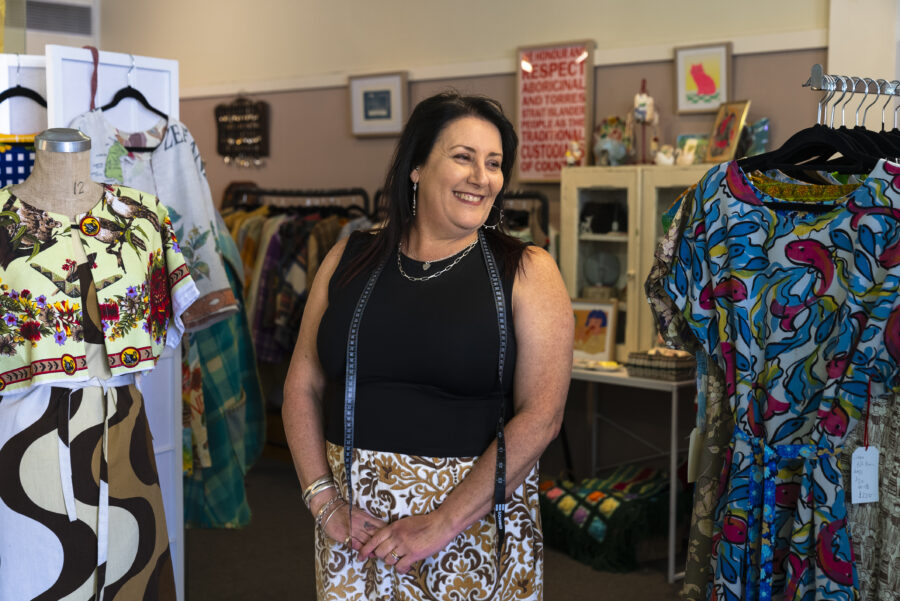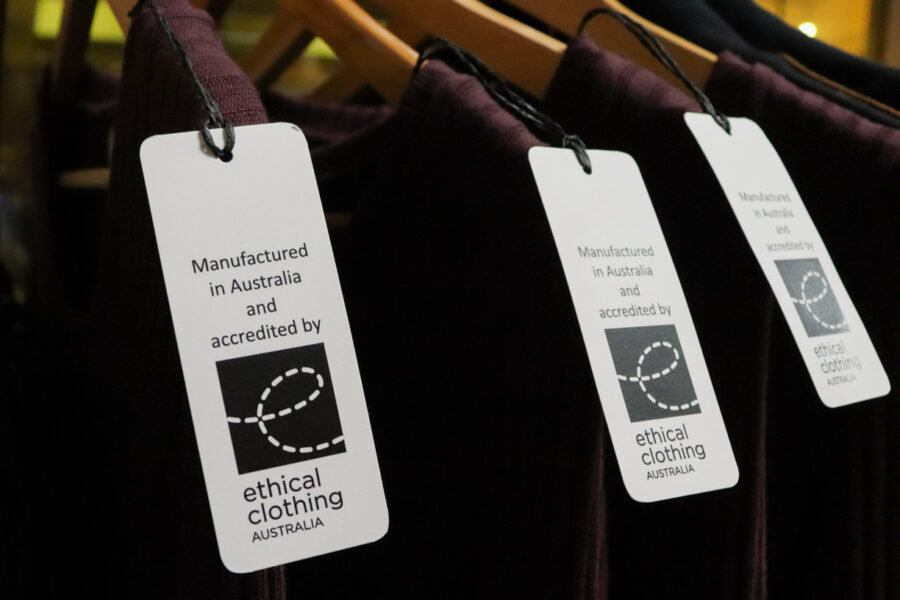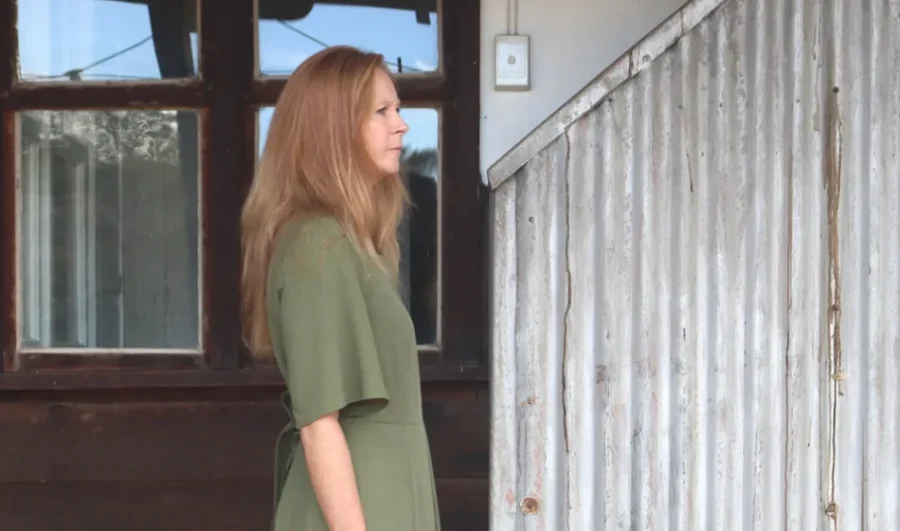Ethical Clothing Australia Week 2024 – Brisbane Event
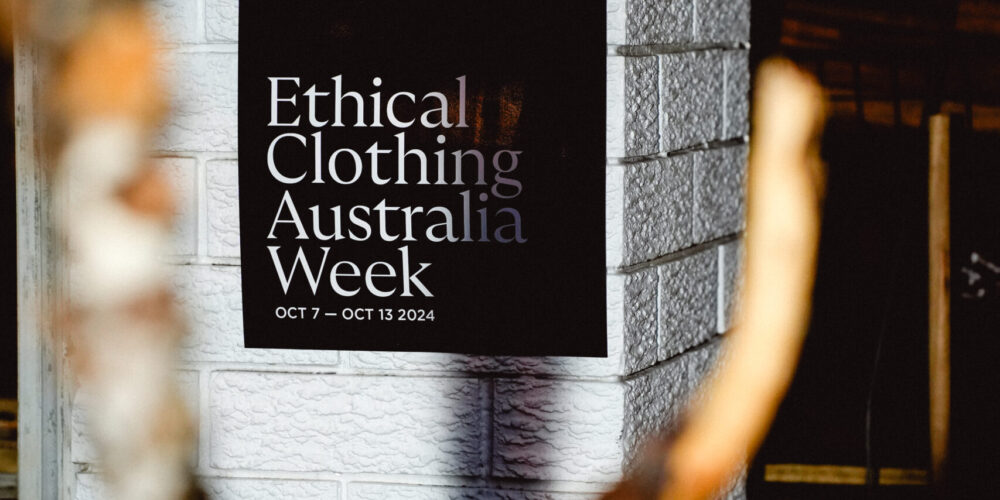
Event
Together, we can create a future where every worker in the industry feels valued, safe and fairly compensated.
While an epic afternoon storm preceded the event, it didn’t dampen the enthusiasm as speakers shared powerful insights at the Ethical Clothing Australia Week 2024 celebration in Brisbane on Tuesday, 8 October. Here’s a recap of the plans and calls to action we heard on the night.
Rachel Reilly, Ethical Clothing Australia’s National Manager addressing guests at Ethical Clothing Australia Week 2024 launch event in Melbourne
With Ethical Clothing Australia Week expanding to Queensland for the first time this year, and a growing ethical fashion community in the state, National Manager Rachel Reilly opened by outlining the organisation’s plans for future growth.
“Thanks to Australian Government support, we now have a five-year strategic plan, launched in July 2024,” Rachel shared. “This plan aims to grow Ethical Clothing Australia, expanding our reach across new states and territories and increasing the number of accredited businesses to protect more workers.”
Rachel highlighted advocacy as a key focus, encouraging government at all levels, including Queensland, to adopt procurement policies that prioritise ethical, local manufacturing. “By doing so, they’re not only reinvesting in the local community but ensuring that reinvestment supports worker protection.”
She also emphasised the need for a robust marketing strategy. “You’ll start seeing us more in online publications, print, radio, podcasts, and even city posters. It’s an exciting time as we approach our 25th anniversary next year,” she added.
Michael Rasmussen, General Manager at Struddys Apparel
Confidence in ethical standards
Michael Rasmussen, general manager of Struddys Apparel spoke to guests about the benefits the business has found since becoming officially accredited at the start of 2024, including being able to confidently tender for larger contracts and ambitiously plan for the future.“It’s helping us,” he said, referring to being an accredited manufacturer.
“The bigger brands in this country want to know that straight away (if a manufacturer holds accreditation) because it’s got to protect their brand. They don’t want to attach to someone who is not ethically approved. It’s much easier now, being ethically approved, to tick it off.”
“We’re on the road to the Olympics for 2032 and we’ve had them (the Australian Olympic Committee) come out and scope out our building,” he said.
“We’re confident to bring them in because we know everything is up to standard. Our journey is to be the Olympic supplier in 2032 and hopefully the government backs their “Buy in Queensland” policy so we can employ more people, and people can say they got to make the Olympic uniforms.”
Pointing to the installation of paper dolls that took up an entire wall of the venue to represent the thousands of workers protected by Ethical Clothing Australia’s accreditation, Michael reflected on what is most important to Struddys in business. “You guys come in and help us to make sure that everything is safe, and employees are protected – if they’re happy, we’re happy.”
Dr Zoe Mellick from QUT
A huge opportunity to prioritise ethical practices
In recognition of the work that is needed to support transparency and ethical practices in the local industry, QUT’s Dr Zoe Mellick spoke about the research she and colleagues Associate Professor Tiziana Ferrero-Regis and Justine Coneybeer are undertaking to gather data about garment manufacturing and ethical practices in Southeast Queensland.“We want to understand small businesses and their awareness of labor issues and legislation,” said Dr Mellick. “And more importantly, we want to understand where we can strengthen industry adoption of fair labor practices.
“Garment manufacturing plays a critical role in Queensland and in Queensland’s economy,” she continued. “But we also know that it comes with its fair share of challenges. Globally, Australia included, many workers remain unseen, and outworkers and homeworkers are highly vulnerable. Yet these workers are central to the success of small and medium enterprises, which form the backbone of our local industry.”
Dr Mellick went on to outline why this research is both timely and essential for the future of local manufacturing and pointed to the 2032 Olympics in Brisbane as a major moment for the industry.
“We know that there’s growing pressure from the political sphere, but also the industry itself wants to increase Australian manufacturing capacity here, and we know that we need to safeguard workers’ rights as that happens,” she said,
“And obviously we have the 2032 Olympics – and we’ve got some ambitious goals in the room which is great to hear. There’ll likely be a demand for Australian made and Queensland made uniforms, and we see this as being part of a huge opportunity for Southeast Queensland manufacturers to prioritise ethical practices.
“We believe that this project will benefit everybody in this room, and it’ll help us make Queensland garment industry stronger, fairer and more sustainable as well,” she finished.
Fiona Peck from the Textile, Clothing and Footwear Union
Fair pay is not just a legal obligation, it's a moral imperative
The final speaker of the event with Fiona Peck, Compliance Officer in Queensland for the Textile, Clothing and Footwear Union who opened with a powerful recognition of the people who make our clothes in Australia.“I want to take the opportunity during Ethical Clothing Australia Week to recognise the hard-working individuals who form the backbone of our textile, clothing and footwear industry, from visionary designers to skilled workers, including outworkers.
“Our workforce is incredibly diverse and includes designers who bring creativity and innovation, factory workers who meticulously bring designs to life, and our workers who work diligently within their homes. Each of these roles is essential to the fabric of our industry, and each worker deserves respect, fair compensation and safe working conditions.
“However, we know that many work workers face significant challenges, issues such as inadequate pay, unsafe environments and exploitation can overshadow the dedication and skills they bring to their work. As we celebrate this week, we must commit ourselves to addressing these challenges head on and ensuring that every worker is treated with dignity and fairness.”
Fiona also gave some insights into her work with Ethical Clothing Australia as a Compliance Officer for the TCF Union.
“I focus on two crucial areas, wages and entitlements and the safety audits. These functions are not merely about meeting legal requirements; they’re fundamental to safeguarding the rights of workers and ensuring ethical practices throughout the supply chain.
“With wages and entitlements, it’s my responsibility to ensure that workers are compensated fairly, and this includes verifying that all workers, whether in a factory or working at home as an outworker, receive wages that meet the minimum requirements.
“Fair pay is not just a legal obligation, it’s a moral imperative. Each worker’s salary reflects their commitment and plays a crucial role in their financial stability and overall well-being.”
By the same token, Fiona emphasised that safety audits that are part of the accreditation process are not merely a checklist.
“It’s about fostering a culture of care, so workers feel secure in their environment and are more productive and engaged. By conducting the safety audits, I help create workplaces where workers can feel safe and contribute positively to the industry.”
Fiona finished with a powerful call to action for all attendees.
“I urge you to reflect on the impact we can have when we prioritise the rights of the workers in our industry,” she said. “Whether you’re a business owner, a consumer or an advocate, there are numerous ways to support ethical practices. Choose to buy ethically and locally made, demand transparency and support brands that prioritise the well-being of the workers.
“I feel that together, we can create a future where every worker in the TCF industry feels valued, safe and fairly compensated.”
A celebration of the people who make our clothes in Australia!
An exhibition of accredited items from Chamani the Label, Lenka Couture, Struddys and Citizen Wolf was a testament to the wide-ranging capabilities of our textile, clothing and footwear industry and guests also enjoyed watching live illustrations from artist Emma Bond, who captured both the garments on display and the speakers.The event also featured a sneak peek of some of the incredible Worker Stories featuring in a social media campaign released during Ethical Clothing Australia Week 2024.
We were so grateful to Paula, Suze, Michelle, Chatcha, Tahni, Maggie, Erin, Maria, Bleh Wah, Rachel and Holly and outworkers in New South Wales and South Australia for sharing their stories with us – it was a privilege to create a space for these extraordinary people to be acknowledged and celebrated!
Finally, as at our Melbourne launch, a full wall of the venue showed an installation of over 3000 paper dolls, representing the thousands of workers across Australia who are protected by the Ethical Clothing Australia accreditation program. The dolls were colour coded according to states (black for Victoria and New South Wales), white for Queensland, South Australia and Western Australia and blue for Tasmania and the Northern Territory). Importantly 77% of the dolls were created as women (shown using feminine hairstyles and dresses) to represent the highly gendered Australian TCF industry.See more photos from the Ethical Clothing Australia Week 2024 event in Brisbane here!
Ethical Clothing Australia Week 2024 has been made possible due to a grant from the Australian Government Department of Industry, Science and Resources and a grant from the Victorian Government Department of Jobs, Skills, Industry and Regions. We are grateful for the continued support of Ethical Clothing Australia.
To find out more about Ethical Clothing Australia’s upcoming events, be sure to subscribe to our newsletter and follow us on Instagram, Facebook and LinkedIn.
Related articles
Explore more insights, updates and stories from across Australia’s ethical and local manufacturing industry.

